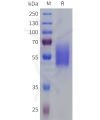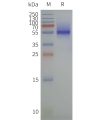SCTR recombinant proteins and antibodies
Secretin Receptor (SCTR) is a G protein-coupled receptor (GPCR) that interacts with the gastrointestinal hormone secretin. It plays a critical role in regulating digestive processes, especially in the pancreas, liver, and intestines. Upon binding with secretin, SCTR promotes the secretion of pancreatic fluids and gastric acid, contributing to digestion. Additionally, SCTR is involved in regulating water and electrolyte balance, enzyme secretion in the intestines, and insulin secretion from the pancreas.
The receptor is crucial in maintaining normal digestive and metabolic functions. Abnormal activity of SCTR is associated with a variety of diseases, such as peptic ulcers, pancreatitis, diabetes, and certain types of cancer. Therefore, SCTR has emerged as an important drug target, with significant potential in the treatment of gastrointestinal disorders, metabolic diseases, and tumors. By targeting SCTR, drugs can regulate digestive secretions, alleviate symptoms of gastrointestinal disorders, and even provide potential therapeutic benefits for cancer treatment. Current drug development targeting SCTR mainly focuses on two areas: gastrointestinal disease treatment and cancer therapy. SCTR agonists and antagonists are being developed as potential drugs for gastrointestinal disorders. Agonists enhance the activity of the SCTR receptor, promoting the secretion of gastric and pancreatic fluids, which may help improve digestion and alleviate symptoms of gastrointestinal conditions such as indigestion and pancreatitis. On the other hand, SCTR antagonists are being developed to inhibit excessive secretion caused by the overactivation of SCTR, potentially alleviating conditions such as peptic ulcers and gastroesophageal reflux disease (GERD).
Several pharmaceutical companies, including Ipsen and Amgen, are actively involved in developing drugs targeting the SCTR receptor. Ipsen is working on an SCTR agonist currently in preclinical research, aimed at treating pancreatic insufficiency and other digestive disorders. This drug aims to enhance pancreatic function and improve digestion in patients with insufficient pancreatic secretions.Amgen is focused on the development of SCTR antagonists, which are designed to treat conditions related to excessive gastric acid secretion, such as GERD and peptic ulcers. Novartis is also exploring the potential of SCTR in cancer treatment, particularly in tumors where abnormal SCTR activation contributes to tumor growth and metastasis. Novartis is evaluating the use of SCTR antagonists in treating gastrointestinal tumors and pancreatic cancer. As research on the SCTR receptor progresses, more innovative drugs are expected to enter clinical trials, particularly for gastrointestinal diseases and cancer treatment. SCTR as a drug target has broad development prospects and may offer new treatment options for patients in the future, improving their quality of life.
To assist in the development of drugs targeting SCTR, DIMA BIOTECH can now provide full-length SCTR recombinant membrane protein developed by its nanodisc membrane protein platform. SCTR nanodisc is an optimal solution for screening small molecules targeting SCTR with its natural structure. Furthermore, DIMA BIOTECH has also prepared a SCTR single B cell seed library, from which lead antibody molecules can be obtained in as fast as 28 days.
ECD Proteins
SKU: PME101810 Target: SCTR Tag: C-Human Fc tag
Price:10μg $90.00 ; 50μg $320.00 ; 100μg $480.00
Full Length Transmembrane Proteins
SKU: FLP120465 Target: SCTR Tag: C-Flag&Strep Tag
Price: 10 μg $810.00 ; 50 μg $3960.00 ; 100 μg $7200.00
Full Length Transmembrane Proteins
SKU: FLP100465 Target: SCTR Tag: C-Flag Tag
This product is no longer available. Click here to view recommended products



